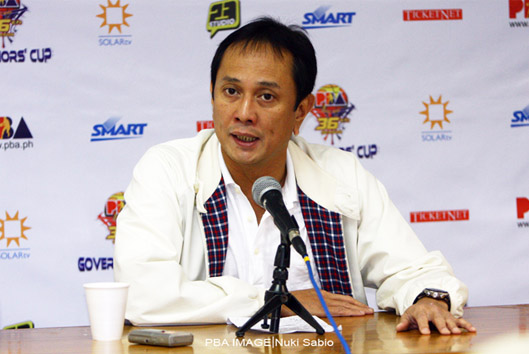MANILA, Philippines—Sheltered barely by an awning above glass doors that open to a hotel poolside, PBA commissioner Chito Salud contrasted the post-typhoon atmosphere with the same optimism that he exuded in a just-concluded press conference.
His mission and the means seem incongruent, the latter almost sounding like a threat that could blow to pieces the former, but he is confident he has things figured out.
Salud, on his second year at the helm of a professional league struggling to carve a new niche in today’s pop culture, is hopeful the 37th season will showcase a long sought-after parity where at least seven teams could contend for the three championships at stake.
“That’s a good sign,” he told Inquirer.net.
“Personally I see seven or eight teams capable of winning the championship,” Salud added. “And ideally, if we can keep doing this and have seven or eight teams dividing the three trophies among themselves, then we’re headed to tougher competition and even greater parity.”
Somehow, though, in his battle to level the playing field, he wields an unlikely weapon. The season marks the league’s return somewhat to big-time paydays, a development that should have money-lined squads working out and flexing their fiscal muscles—especially since there will be unrestricted free agents this time.
He shrugged off the concern like they were nothing more than renegade raindrops falling on his dark suit.
The league’s decision to increase the team cap by roughly 17 percent and the individual cap by 20 percent, Salud feels, won’t be harmful to his quest for full parity in the long run because it treads a delicate line that benefits every team in the league.
“We feel that at the rate that we have right now, even the smaller teams can be competitive,” he said.
The principle is simple. At the current caps—team and individual—Salud is confident that relatively medium-sized teams—financially—won’t bleed themselves dry to stay in step with the rich and powerful. At the same time, cash-filled squads would have to pony up more to reel in free agents to their fold.
But the key, he added, is for the league to upgrade its vigilance on salary cap matters.
“Obviously, because there are teams that are more financially capable than others, we have to be vigilant and make sure that there is strict adherence to the salary cap,” said Salud. “That’s the only way we can fully even up the playing field.”
The PBA commissioner’s office will also continue to screen trades and Salud vows to veto deals that are obviously one-sided.
“There will never be a perfectly even trade,” he said. “But we will look at every factor of the deal to make sure that both parties benefit from it.”
Salud sought—and was granted—veto powers last season to put an end to what the public viewed as outright purchasing of players through blatantly one-sided trades, a move that most probably set the stage for what he feels will be an interesting season.
“There will be keener competition from a more balanced field this time,” he promised.
Another way to ensure parity grows from a field of higher paychecks is to ensure a stable field with teams that get more returns on their investments. If teams find the league commercially viable, they will stay. And the longer they stay, the more they will able to build contenders. Also, teams get their share of league profits from gate receipts and television earnings. Therefore, the higher the league earns, the happier teams will be.
“That’s why we have to go for higher ratings and bigger gross receipts,” Salud said. “The best way to achieve that is to reach out to a younger base of fans.”
The second-year commissioner had watched his father, the late sportsman-lawyer Rudy, stay at the helm of the PBA when it reached heights of popularity that now seem a dream. And he noted that the same people who drove that spike in league popularity are still the ones filling seats in games.
“We hope to grow new fans,” he said, adding that the target is the 12-35 age group.
He plans to give the league a more visible presence online, where the new breed of hoop habitués generally converge. He hopes to put his superstars in giant billboards. He wants advertisements heralding PBA games. He okayed formats that call for more knockout matches and fewer no-bearing games.
But he admitted that at the core of everything is the competitiveness of each playdate.
“We will continue to seek that parity until we achieve it,” Salud said.
And after arming teams with greater spending power, he hopes this season will be the start of the fulfillment of that mission.


